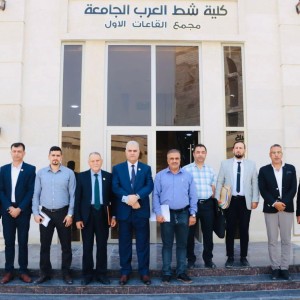About the department
The Department of Power Mechanical Technology Engineering was established at Shatt al-Arab Private College in 2023 due to the governorate’s need for this specialty. Its input was from graduates of preparatory school in the scientific stream (biological and applied), in addition to industry graduates. Modern scientific curricula have been adopted and keep pace with the development of the student’s scientific and practical material.
View section
The Power Mechanics Technology Engineering Department seeks excellence and leadership in the field of engineering sciences by educating students and providing them with experience, skills, capabilities and scientific foundations in the specializations of renewable energy engineering, refrigeration and air conditioning engineering, and production and automation engineering at the level of preliminary studies for the aforementioned specializations and postgraduate studies for the specialization of refrigeration and air conditioning engineering by adopting quality standards. Global training to qualify them to be applied engineers to support the wheel of development in our country with the necessary competencies to advance the Iraqi reality in a way that keeps pace with the rapid developments in technology and the renewed requirements of the Iraqi society and competition, given the urgent need for these specializations in the field of work.
The message
Creating a distinguished theoretical and practical academic atmosphere for students by giving valuable scientific lectures in the specialty, conducting laboratory experiments and creative scientific research, and interacting with the local and global environment that serves the community in the field of work on devices in the department’s laboratories.
Objectives
1. Technical knowledge: Providing scientific knowledge in the field of mechanical engineering in general and in the field of power mechanical engineering in particular, along with the knowledge necessary to support mathematics, computer science, and engineering basics.
2. Technical skills: Developing the skills necessary to implement laboratory and field projects. As well as developing the ability to formulate projects and problems and develop a plan to benefit from them
3. Communication skills: Developing the ability to present information effectively, whether orally, in writing, or with graphics.
4. Preparation for graduate studies: Providing sufficient breadth and depth for the success of subsequent graduate studies, post-graduate studies and continuing learning.
5. Preparation for the profession: Provide a broad appreciation of the problems that arise in the professional environment. Training on teamwork, leadership, occupational safety, ethics, economics
2. Technical skills: Developing the skills necessary to implement laboratory and field projects. As well as developing the ability to formulate projects and problems and develop a plan to benefit from them
3. Communication skills: Developing the ability to present information effectively, whether orally, in writing, or with graphics.
4. Preparation for graduate studies: Providing sufficient breadth and depth for the success of subsequent graduate studies, post-graduate studies and continuing learning.
5. Preparation for the profession: Provide a broad appreciation of the problems that arise in the professional environment. Training on teamwork, leadership, occupational safety, ethics, economics




